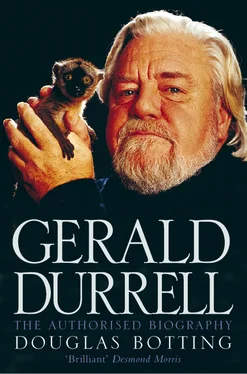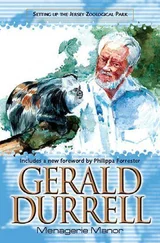He was always conscious of this, especially when he became a high-profile practitioner and spokesman of the very science he had never been formally taught. Much later, he was to say:
Yes, a degree might have helped – but would it? In the long run it might have killed the other side of me. Because of no job, which was because of no degree, only the need to write for a living compelled me to write at all. Also, the degree idea is waved about like a flag to such an extent that one thinks one needs it – when it’s only society needing it. These absolute dolts in my own field have the application to store knowledge like a squirrel and regurgitate it all over ruled paper at the right moment. That shows a sense of inferiority on my part, doesn’t it?
More than compensating for his lack of formal qualifications, Gerald was endowed with a highly developed and inventive intelligence. His Corfu childhood under the tutelage of Theo Stephanides had provided him with a superlative insight into the phenomena of natural life, an education in hands-on biology largely denied to his peers in the United Kingdom, and his brother Lawrence had instilled in him the principles of creative literature in a way no classroom lessons could have done. The rest of the family, his mother especially, also contributed. ‘She encouraged us in everything we wanted to do,’ he was to recall. ‘She would say, “Well, try it, dear,” and if it failed, it failed. I was allowed to read anything I wanted to. Every question I asked was answered absolutely honestly, if it could be answered. In a funny way, I got a unique education which included dealing with an endless procession of eccentrics – so now, nothing a human being does surprises me.’
But his grasp of the mainstream of schoolboy learning – sums and stinks and 1066 and the rest – was patchy and uncertain. Gerald was therefore a highly unorthodox teenager in the Britain of his time. The familiar routine of morning assemblies and school games and end of term exams had passed him by. His primary education was fragmentary, his secondary education nil, his chances of higher education non-existent. For a youth with such an apparently oddball background there was only one option in wartime Bournemouth – to get a job, probably a mundane and lowly one, until he was old enough to be called up and have his head shot off in the war.
The only job that Gerald could imagine tolerating was working with animals. Though it doesn’t sound much, for Gerald a day spent in a pet shop in the company of white rats was not a day wasted. He had managed to run an aviary and keep a few adders in the garden at home during these years, but the largest animal he had to cope with was a fallow deer which was given to him by a boy who lived in the New Forest and was moving to Southampton. The boy had described it as a ‘baby’ and a ‘household pet’, but when it arrived it turned out to be a petulant creature at least four years old – far from the submissive, friendly fawn Gerald had been promised. With much patience he eventually learned how to pacify the deer, which he named Hortense, by scratching the base of its antlers, but in the end he had to give way to family pressure, and Hortense was exiled to a nearby farm.
As for the war, though a few stray bombs did land on Bournemouth, one of them rocking the treasurehouse of Commin’s bookshop, Gerald admitted that he did not really know what war was, nor care very much about it.
We used to see Southampton get a pasting, eagerly enjoying the eastern sky aflame, and there were plenty of jolly dogfights upstairs – but on the whole we had a cushy war. The entire family did. We were pinned to the nine o’clock news, cheering for victory, and I followed daily the progress of the battles on whatever front it was … but only selfishly. I wanted to get the war over as fast as possible and do something interesting, like return to Greece and see how the Germans had behaved to the swallowtails and trapdoor spiders. Even so, I spent every moment out of doors – aged fifteen to twenty – risking death at the hands of the bombers on the way to Coventry or somewhere that really copped it. I helped with the harvest. I went out – not on a donkey now, but a bicycle – looking for nests and animals, rediscovering the local fauna with more patience and a maturer knowledge, like waiting for the bird to return to her nest to make sure of the species, at any hour of day or night, because I was used on Corfu to regarding the villa merely as a dormitory. The outside was home. Two hundred yards from the house I had the woods to keep an eye on, and then at the end of the road the golf links, beyond which the country started. The real country. Bournemouth in my time was a country town. It was ideal from my point of view – though of course it wasn’t Corfu.
The ‘real country’ was the moorlands of the Purbecks, the wilder woodlands of the New Forest, the broad sweep of shore and water around Poole Harbour. Once he went much further afield, on a bird-watching holiday to the outlying Scilly Isles, beyond the western tip of Cornwall.
Gerald found England stiff and starchy after the relaxed lifestyle of his Mediterranean island, especially when it came to sex and girls. He had reached puberty on Corfu, and with a little help from a young local girl he had discovered sex – or at least its preliminaries – without suffering any of the inhibitions and sense of guilt that tormented so many of his contemporaries in England. On Corfu sex had seemed something pure and natural – a romp and a tumble in the olive woods and myrtle groves, a giggle and a tangle of limbs.
On Corfu all his tutors had taught him about sex, and it was discussed quite freely at home. In England, by contrast, it was Presbyterian black and sin-laden. ‘I couldn’t understand why in England boys of my age found something dirty and furtive about it. And I was soon to realise with girlfriends in Bournemouth that I couldn’t treat them with quite the same gay abandon in case they thought me naughty and wicked. In some confusion I was forced to retreat to a chaste and stolen kiss on the brow. It was like being suddenly flung out of Rabelais into William Morris.’
Gerald was a good-looking youth, with an attractive, open face and engaging manner. His good looks were almost to prove his undoing when a local girl was raped, strangled and mutilated, and her body found under the rhododendrons in one of the local beauty spots called the Chines. The Bournemouth Echo reported that the police were anxious to interview a tall, fair young man with blue eyes and a charming personality – Gerald to a tee. Mother, of course, immediately saw the hempen rope being adjusted around her son’s neck.
‘You’re not to go out, dear,’ she warned Gerald. ‘You might be arrested as the murderer. You’re to stay at home. You know what the police are like. Once they’ve arrested you they’ll never stop till they’ve hung you. And hanging’s no laughing matter.’
Within a day or two, a couple of detectives did indeed call at the house in order to eliminate the young naturalist from their inquiries. Satisfied with Gerald’s answers to their questioning, they left without even taking his fingerprints. When they had gone, Mother reappeared.
‘Now, tell me what you said, dear,’ she insisted. ‘It’s very important to get our stories to match when we’re in court.’
In some ways Gerald at this time was almost feminine in his looks. But he did his best to disguise it, partly because he had found, to his embarrassment, that he was becoming attractive to homosexual men. This sometimes got him into difficulties, and was all the more galling because he was totally heterosexual himself. ‘In those days I used to plaster my pale blond hair with vaseline,’ he recalled, ‘hoping it would become a manly dark brown and thus attract all the ladies who would otherwise have thought me too weak and pretty. Little did I know that this treatment plaited my long locks into something closely resembling an eel migration of some magnitude and only the kindliest and ugliest of girls would consent to be seen with me.’
Читать дальше










